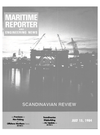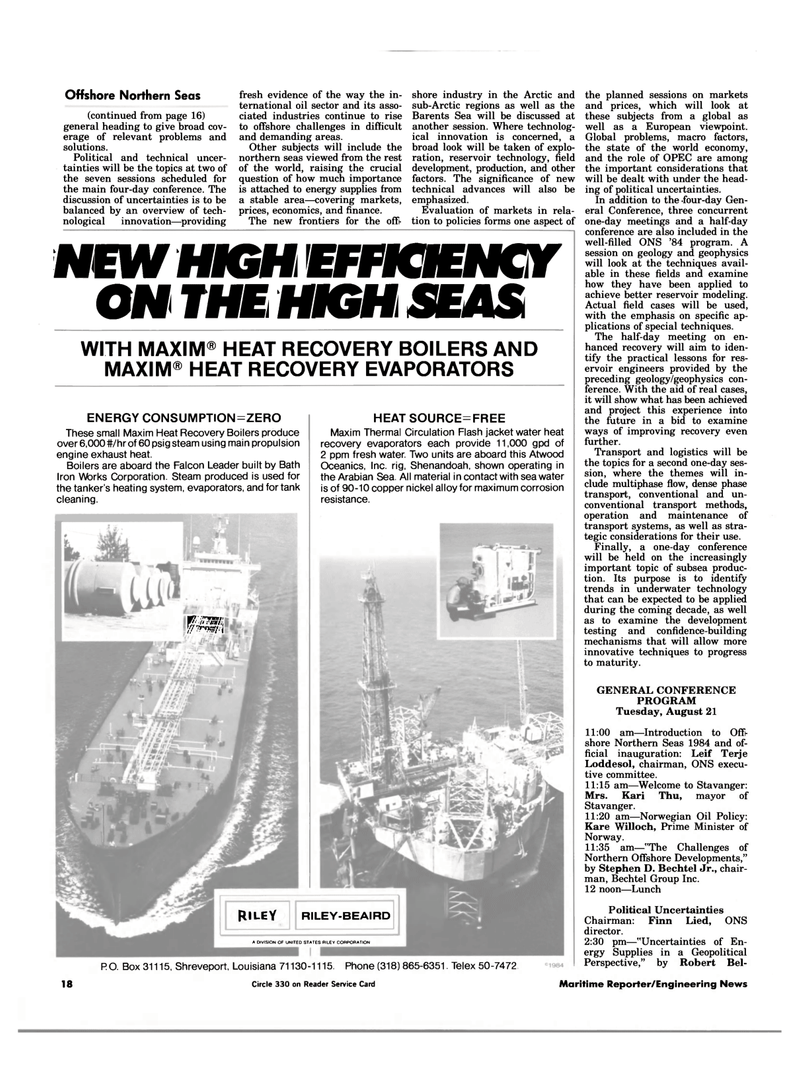
Page 16: of Maritime Reporter Magazine (July 15, 1984)
Read this page in Pdf, Flash or Html5 edition of July 15, 1984 Maritime Reporter Magazine
Offshore Northern Seas (continued from page 16) general heading to give broad cov- erage of relevant problems and solutions.
Political and technical uncer- tainties will be the topics at two of the seven sessions scheduled for the main four-day conference. The discussion of uncertainties is to be balanced by an overview of tech- nological innovation—providing fresh evidence of the way the in- ternational oil sector and its asso- ciated industries continue to rise to offshore challenges in difficult and demanding areas.
Other subjects will include the northern seas viewed from the rest of the world, raising the crucial question of how much importance is attached to energy supplies from a stable area—covering markets, prices, economics, and finance.
The new frontiers for the off- shore industry in the Arctic and sub-Arctic regions as well as the
Barents Sea will be discussed at another session. Where technolog- ical innovation is concerned, a broad look will be taken of explo- ration, reservoir technology, field development, production, and other factors. The significance of new technical advances will also be emphasized.
Evaluation of markets in rela- tion to policies forms one aspect of the planned sessions on markets and prices, which will look at these subjects from a global as well as a European viewpoint.
Global problems, macro factors, the state of the world economy, and the role of OPEC are among the important considerations that will be dealt with under the head- ing of political uncertainties.
In addition to the four-day Gen- eral Conference, three concurrent one-day meetings and a half-day conference are also included in the well-filled ONS '84 program. A session on geology and geophysics will look at the techniques avail- able in these fields and examine how they have been applied to achieve better reservoir modeling.
Actual field cases will be used, with the emphasis on specific ap- plications of special techniques.
The half-day meeting on en- hanced recovery will aim to iden- tify the practical lessons for res- ervoir engineers provided by the preceding geology/geophysics con- ference. With the aid of real cases, it will show what has been achieved and project this experience into the future in a bid to examine ways of improving recovery even further.
Transport and logistics will be the topics for a second one-day ses- sion, where the themes will in- clude multiphase flow, dense phase transport, conventional and un- conventional transport methods, operation and maintenance of transport systems, as well as stra- tegic considerations for their use.
Finally, a one-day conference will be held on the increasingly important topic of subsea produc- tion. Its purpose is to identify trends in underwater technology that can be expected to be applied during the coming decade, as well as to examine the development testing and confidence-building mechanisms that will allow more innovative techniques to progress to maturity.
GENERAL CONFERENCE
PROGRAM
Tuesday, August 21 11:00 am—Introduction to Off- shore Northern Seas 1984 and of- ficial inauguration: Leif Terje
Loddesol, chairman, ONS execu- tive committee. 11:15 am—Welcome to Stavanger:
Mrs. Kari Thu, mayor of
Stavanger. 11:20 am—Norwegian Oil Policy:
Kare Willoch, Prime Minister of
Norway. 11:35 am—"The Challenges of
Northern Offshore Developments," by Stephen D. Bechtel Jr., chair- man, Bechtel Group Inc. 12 noon—Lunch
Political Uncertainties
Chairman: Finn Lied, ONS director. 2:30 pm—"Uncertainties of En- ergy Supplies in a Geopolitical
Perspective," by Robert Bel-
NEW HIGH EFFICIENCY ON THE HIGH SEAS
WITH MAXIM® HEAT RECOVERY BOILERS AND
MAXIM® HEAT RECOVERY EVAPORATORS
ENERGY CONSUMPTION=ZERO
These small Maxim Heat Recovery Boilers produce over 6,000 #/hr of 60 psig steam using main propulsion engine exhaust heat.
Boilers are aboard the Falcon Leader built by Bath
Iron Works Corporation. Steam produced is used for the tanker's heating system, evaporators, and for tank cleaning.
HEAT SOURCE=FREE
Maxim Thermal Circulation Flash jacket water heat recovery evaporators each provide 11,000 gpd of 2 ppm fresh water. Two units are aboard this Atwood
Oceanics, Inc. rig, Shenandoah, shown operating in the Arabian Sea. All material in contact with sea water is of 90-10 copper nickel alloy for maximum corrosion resistance. mm ypTrmfn
RILEY RILEY-BEAIRD
A DIVISION OF UNITED STATES RILEY CORPORATION
RO. Box 31115, Shreveport, Louisiana 71130-1115. Phone (318) 865-6351. Telex 50-7472 18 Circle 330 on Reader Service Card Maritime Reporter/Engineering News

 15
15

 17
17
